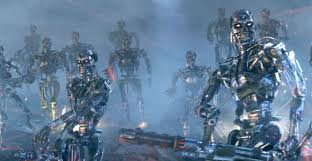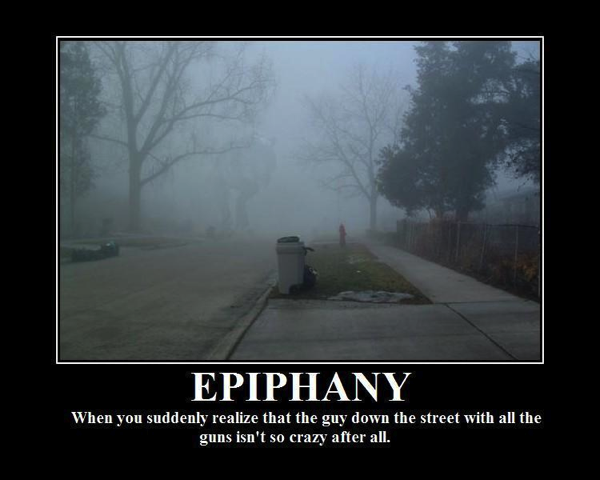We’ve heard the perennial excuse “It’s Computer Error”.

I’ve had one too many occasions where I was told something was due to a computer error where I followed on with “So you knew the computer was in error and yet you continued on with … (Whatever the screwup was)?”
Think about it, usually these kind of errors are in a single corporation…
What happens if you magnify that by hundreds of thousands of computers where all of those machines are linked together?
Far from having a “Terminator” or “SkyNet” experience, you have instead a degenerating mass of corrupted data.
One example I can think of are our three major Credit reporting agencies… They share the same data pool.

The practical upshot of this sharing is that the three systems synchronize to the lowest common denominator. Which means if you have an erroneous black mark on your record appear on one of the services you’ll have that black mark replicated on all the other services.
Once the black mark appears it can take as many as 12 interventions on your part to have a correction remain permanent. I’ve personally had this happen and spent a year removing the same piece of bad data from each service repeatedly because the services were sharing it back & forth.
But what about other more subtle information?

Truly, the internet has given voice to all.
It’s pretty easy to figure out when village idiots are speaking in your own village? Folks all know “That Child ain’t right” and they’ll tell you so.
But can you be so certain when the Idiot is from another village? You don’t have access to the common wisdom of the folks from that other village. How do you verify whats being said is really true?
I started thinking about this the other day when I read an article on the web that had been published under the auspices of National Geographic.
The article in question rather loosely tossed around a few terms, fossil being one of them. The writer described Carbon14 dating being done on the Chitin of insect which had been fossilized. Fossilization typically describes the replacement of biomatter with mineral compounds.
We have discovered badly degraded dinosaur tissues in the fossilized long bones of some of the largest dinosaurs. but the mineralization process seems to work from the outside in.
Insect exoskeletons made of chitin presumably would be the first thing to be mineralized.
Without bio-matter C14 testing doesn’t work.
Which leads inevitably to the conclusion that some of the data the writer was quoting was inaccurate.
I was disappointed because I have pretty high regard for National Geographic publications. I couldn’t help thinking about my nieces and nephews arguing what they read in an article online with their Geologist Grandfather. Their Grandfather would at worst tell them they and their source was full of caca. At best he’d demand to see the article himself and after reading it conclude that the writer was too loose with the language.
Knowing their grandfather as I do, I wouldn’t be surprised to hear that he wrote National Geographic and demanded they print a properly credited and corrected article.
This morning I was involved in a discussion about the marvels of Tablet computers in our schools and the revolutionary concept of interactive textbooks.
Then I thought of the libraries.
Schools, Elementary through College used to have extensive libraries. I’ve noticed public libraries closing and wondered if the same trend was happening in education.

It was at this point that I had a slight epiphany.
A book, a real printed book that sat on a shelf in a library contained “facts”. Those “facts” could be referenced by citing the book, the author, the publication date, revision, chapter, page number, paragraph, and line.Today textbooks and research materials are available online but they also exist as hardcopies. If publishing moved to an online only paradigm these materials risk becoming ephemeral.
If the “facts” changed, another book was printed that contained all the revisions. It got placed on a shelf next to the previous edition and the world spun on.
If a book exists only as a digital entity, instantly downloadable and revisable online, can you be sure of the “facts” contained in the book? What you read last week, you might be unable to reference this week due to an update.
Within the pages of this blog, with absolutely no regard to the changes in meaning or in fact the subject of a particular piece I’ve made edits to what I’d said previously. I pressed the “Publish Button” overwrote what I’d said and I never gave it a thought.
What happens if textbooks are treated with the same cavalier attitude?

Johnny or Jane learn today that Syrias uprising was a completely internal affair. Their textbooks say so. But tomorrow the Syrian uprising is found to be caused by an external player. Johnny or Jane, if they miss the update will be incorrect on their final exam.
This is of course an extreme example but it illustrates the point.
In a completely digital world how do we know a “fact” is a FACT? (No, I’m not suggesting that we live in “The Matrix”)
It’s said time and again “History is written by the winners.” In the not too distant past, the victors had to go to great lengths to re-write history. In a digital age… all it takes is opening an editor on a computer.
This led me to a disturbing thought
In a society where everything is online… where news is unabridged, unedited, and instantly displayed, we run the risk of being a society of gossip and here-say.
Perhaps, this is why so many people are caught-up in “Reality TV shows”. These are after all nothing more than gossip raised to it’s glitziest form.
The really ironic thing for me to consider is that I never considered the possibilities before now. I played a part in moving this digital age forward and I looked upon those who were not seduced by the promise of technology with some disdain.

As I look at it now, perhaps those who were cautionary weren’t Luddites. Perhaps they were simply better acquainted with the lowest common denominator of human behavior.
I can’t help but draw a very loose parallel to the angst Robert Oppenheimer expressed when he understood the full nature of what he had created.
I like digital books, but I think with my favorites… I’m going to buy hard copies. Just to be sure.
FYI I just edited this entry… Mostly for the hell of it.
Have a Great Weekend!
